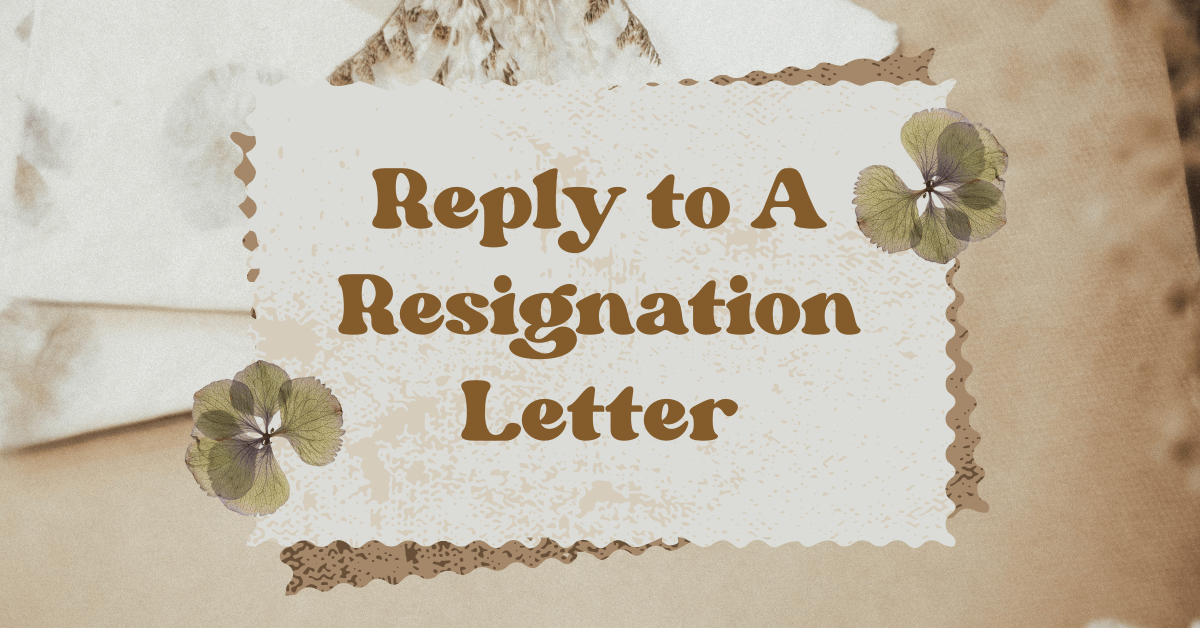Navigating the intricacies of professional communication, responding to a resignation letter becomes a crucial aspect of organizational etiquette. The essence of a “reply to a resignation letter” lies in its ability to acknowledge an employee’s decision to leave a company formally. This response encapsulates the employer’s sentiments, well-wishes for the future, and often includes details regarding the departure process. Its purpose is straightforward: to provide a considerate and official acknowledgment while maintaining the professionalism expected in such correspondence.
This article serves as a valuable resource for streamlining the process of composing an effective reply to a resignation letter. Recognizing the importance of maintaining a respectful and professional tone, we present templates, examples, and samples to assist in crafting thoughtful responses. By offering these practical resources, our aim is to empower professionals, whether employers or members of the human resources team, to navigate this communication process with confidence. Our collection of response letter samples acts as a guide, ensuring that your replies are not only courteous but also aligned with the prevailing standards of professional communication.
As you delve into this article, you’ll find a wealth of resources that aim to simplify the intricacies of responding to a resignation letter. Our goal is to make this aspect of professional communication more accessible, providing you with the tools needed to navigate employee departures gracefully and in accordance with established norms. Whether you’re a seasoned professional or new to this aspect of corporate dialogue, the shared examples will serve as valuable reference points, fostering clarity and professionalism in your response letters.

Sample of Reply to a Resignation Letter
[Your Name]
[Your Position]
[Company Name]
[Company Address]
[City, State, Zip Code]
[Date]
[Employee’s Name]
[Employee’s Position]
[Company Name]
[Company Address]
[City, State, Zip Code]
Dear [Employee’s Name],
I hope this letter finds you well. I wanted to express my gratitude for your resignation letter, which we received on [date]. While it is disheartening to see you go, I want to acknowledge and appreciate the contributions you’ve made during your tenure at [Company Name].
Your dedication and hard work have not gone unnoticed, and I am confident that the skills and expertise you’ve brought to our team will serve you well in your future endeavors. We understand that career paths often lead to new opportunities, and we respect your decision to pursue this new chapter.
In terms of the transition, we will work closely with you to ensure a smooth handover of your responsibilities. Your last working day will be on [date], and we encourage you to share any important information or documents that will assist in this process.
We wish you nothing but success in your future endeavors, and please remember that the doors of [Company Name] are always open for you. If you need any references or support in the future, do not hesitate to reach out.
Thank you once again for your dedication and hard work. We will miss having you as part of our team, and we hope our paths cross again.
Best regards,
[Your Name]
[Your Position]
[Company Name]
How to Write a Reply to a Resignation Letter
1. Acknowledge the Resignation Graciously
Responding to a resignation letter with grace is crucial. Begin your reply by expressing appreciation for the employee’s contributions. Use phrases like “thank you for your dedicated service” to set a positive tone for the rest of the letter.
2. Confirm the Departure Details
Provide clarity on the logistical aspects of the departure. Confirm the last working day and discuss any transition procedures. This helps in creating a smooth exit strategy and ensures that both parties are on the same page regarding the departure timeline.
3. Express Well Wishes
Extend your best wishes to the departing employee. Wish them success in their future endeavors and acknowledge their potential for growth. This demonstrates a supportive and positive attitude, fostering a sense of goodwill even as they move on.
4. Offer Support and Resources
Assure the departing employee that your support doesn’t end with their departure. Offer references, LinkedIn endorsements, or any other resources that might assist them in their future career endeavors. This reinforces a positive company culture and maintains a good professional relationship.
5. Discuss Knowledge Transfer
If applicable, emphasize the importance of knowledge transfer. Encourage the departing employee to document essential processes and information that will aid the team in their absence. This step ensures a smooth transition for the team and minimizes disruption.
6. Request Exit Interview (Optional)
Politely invite the employee to participate in an exit interview. This can provide valuable insights into their experience with the company and may uncover areas for improvement. Make it clear that their feedback is valuable for the company’s continuous growth.
7. Close on a Positive Note
Conclude the letter on a positive and appreciative note. Express gratitude once again, reiterate your well wishes, and mention that the company doors are always open for them. This helps to maintain a positive relationship, and who knows, paths might cross again in the future.
Remember, maintaining a positive and professional tone in your response is key to leaving a lasting positive impression.
FAQs about a Reply to a Resignation Letter
Responding to a resignation letter can be a delicate task. In this FAQ section, I aim to address common queries related to crafting effective replies to resignation letters. My goal is to provide practical insights and guidance on how to navigate this professional communication with finesse.
1. How should I start my reply to a resignation letter?
In my opinion, initiating your response with a sincere expression of gratitude for the employee’s contributions is a good practice. Use phrases like “thank you for your dedicated service” to set a positive tone and acknowledge their efforts.
2. What key details should be included in a reply to a resignation letter?
I believe confirming the departure details is crucial. Clearly communicate the last working day and discuss any necessary transition procedures. This ensures both parties are aligned on the logistics of the departure.
3. Is it essential to express well wishes in a resignation reply?
Yes, expressing well wishes is a professional courtesy. Extend your best wishes to the departing employee, wishing them success in their future endeavors. This helps in maintaining a positive relationship and leaves the door open for potential collaborations in the future.
4. Should I offer ongoing support in my reply to a resignation letter?
Absolutely. In my opinion, offering continued support and resources, such as references or endorsements, shows that your professional relationship extends beyond their time with the company. It fosters a positive company culture and leaves a lasting impression.
5. How can I handle knowledge transfer in my response?
In my opinion, emphasizing the importance of knowledge transfer is wise. Encourage the departing employee to document essential processes and information. This ensures a smooth transition for the team and minimizes disruption after their departure.
Remember, responding to a resignation letter is an opportunity to leave a positive and lasting impression, even as the employee moves on to new endeavors.
RELATED:
Letter to Cancel Gym Membership
